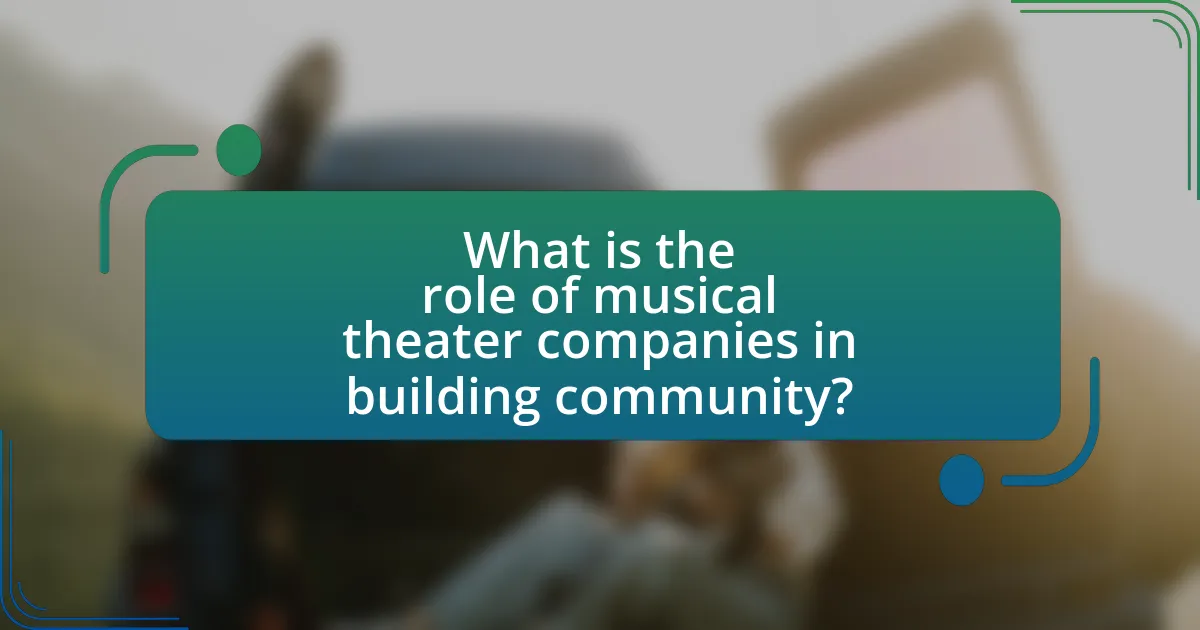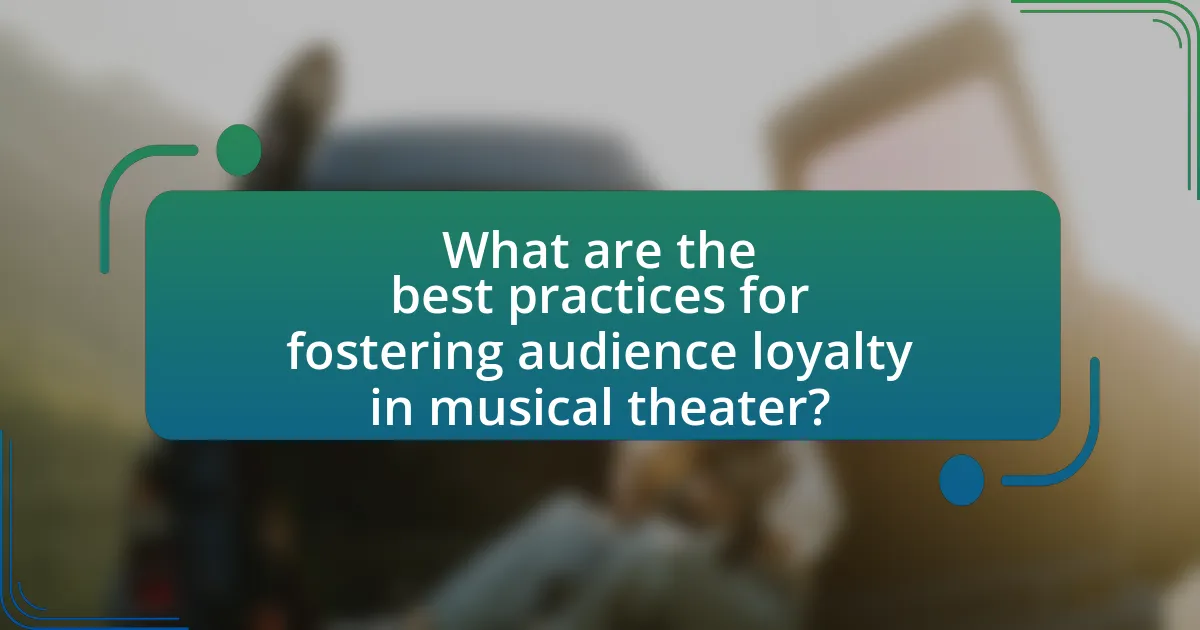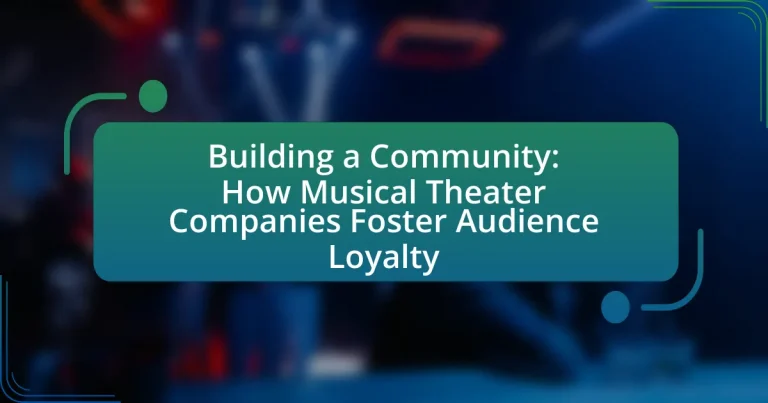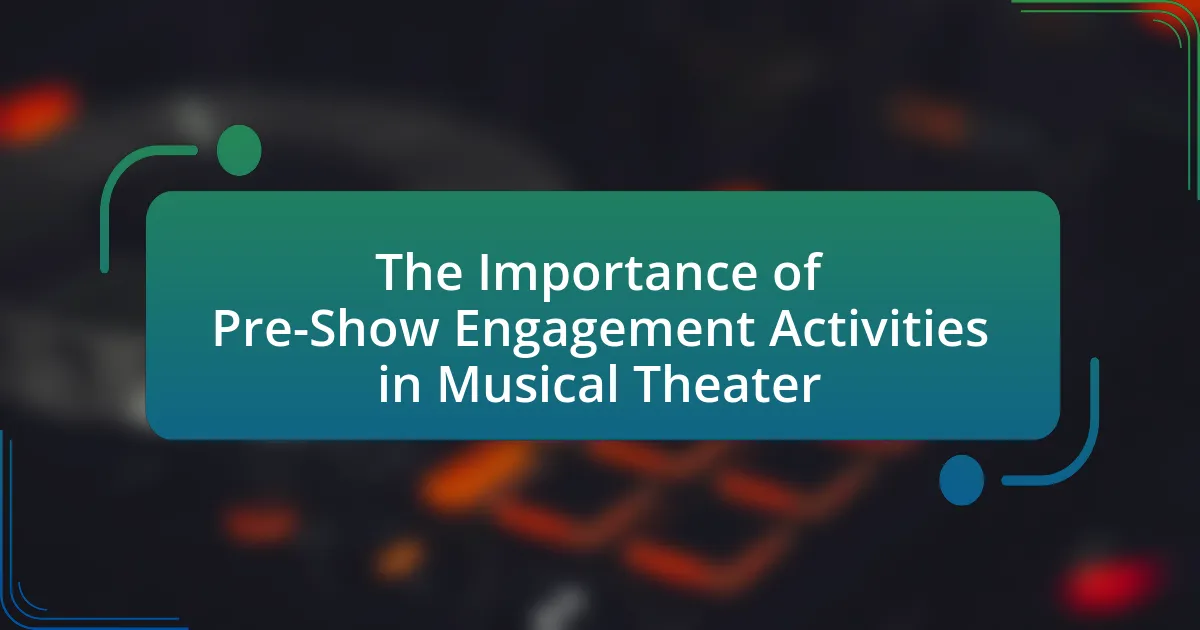Musical theater companies play a vital role in fostering community and audience loyalty through artistic expression and social interaction. They engage audiences via interactive performances, outreach programs, and social media, creating emotional connections through relatable storytelling and immersive experiences. Strategies such as personalized communication, community events, and audience feedback mechanisms are essential for enhancing loyalty and ensuring sustainability. The article explores the impact of these practices on audience engagement, retention, and the overall health of musical theater organizations within their communities.

What is the role of musical theater companies in building community?
Musical theater companies play a crucial role in building community by providing a platform for artistic expression and social interaction. They foster connections among diverse groups of people through shared experiences in performances, which can enhance local culture and identity. For instance, community engagement initiatives, such as workshops and outreach programs, allow individuals to participate in the creative process, thereby strengthening social bonds. Research indicates that participation in the arts can lead to increased civic engagement and a sense of belonging, as evidenced by studies showing that communities with active arts organizations report higher levels of social cohesion and community pride.
How do musical theater companies engage with their audiences?
Musical theater companies engage with their audiences through interactive performances, community outreach programs, and social media engagement. These companies often incorporate audience participation into their shows, allowing attendees to feel more connected to the performance. For example, some productions invite audience members on stage or encourage them to sing along, creating a shared experience. Additionally, many theater companies conduct workshops and educational programs in local schools, fostering a sense of community and encouraging future attendance. Social media platforms are also utilized to interact with audiences, providing updates, behind-the-scenes content, and opportunities for feedback, which enhances audience loyalty and involvement.
What strategies do they use to foster a sense of belonging?
Musical theater companies foster a sense of belonging through community engagement initiatives, inclusive programming, and audience interaction. They often host workshops and events that invite audience participation, creating a shared experience that strengthens connections among attendees. For example, many companies implement outreach programs that target local schools and community groups, encouraging diverse participation and fostering a welcoming environment. Additionally, they utilize social media platforms to engage with audiences, share stories, and highlight community members, which reinforces a collective identity. These strategies are effective in building loyalty and a sense of belonging among audiences, as evidenced by increased attendance and positive feedback from community members.
How do community events enhance audience engagement?
Community events enhance audience engagement by creating opportunities for direct interaction between the audience and the performers, fostering a sense of belonging and connection. These events allow attendees to participate in discussions, workshops, and behind-the-scenes experiences, which deepen their understanding and appreciation of the art form. Research indicates that 70% of attendees at community events report feeling more connected to the organization and its mission, as highlighted in a study by the National Endowment for the Arts. This increased connection leads to higher levels of loyalty and support for the theater company, ultimately enhancing audience retention and participation in future events.
Why is audience loyalty important for musical theater companies?
Audience loyalty is crucial for musical theater companies because it ensures a stable revenue stream and fosters a supportive community. When audiences consistently return, they contribute to ticket sales, merchandise purchases, and donations, which are vital for the financial sustainability of these companies. For instance, a study by the Theatre Communications Group found that loyal patrons are more likely to attend multiple performances and recommend shows to others, amplifying word-of-mouth marketing. This loyalty not only enhances the company’s reputation but also allows for more ambitious productions, as financial backing from a dedicated audience can lead to increased investment in quality performances.
What are the benefits of having a loyal audience base?
Having a loyal audience base provides musical theater companies with increased revenue stability and enhanced community engagement. This loyalty translates into consistent ticket sales, as dedicated audience members are more likely to attend multiple performances and recommend shows to others. According to a study by the National Endowment for the Arts, loyal patrons contribute significantly to the financial health of arts organizations, often accounting for up to 80% of ticket sales. Additionally, a loyal audience fosters a sense of community, encouraging participation in events and discussions, which can lead to greater overall support for the theater company.
How does audience loyalty impact the sustainability of a theater company?
Audience loyalty significantly enhances the sustainability of a theater company by ensuring a consistent revenue stream and fostering community support. When audiences are loyal, they are more likely to attend multiple performances, subscribe to seasons, and participate in fundraising efforts, which directly contributes to the financial stability of the company. For instance, a study by the Theatre Communications Group found that loyal patrons account for approximately 70% of ticket sales in many theater organizations, highlighting the critical role of repeat attendance in maintaining operational viability. Additionally, loyal audiences often engage in word-of-mouth promotion, attracting new patrons and expanding the theater’s reach, further solidifying its long-term sustainability.

How do musical theater companies create emotional connections with their audiences?
Musical theater companies create emotional connections with their audiences through relatable storytelling, powerful performances, and immersive experiences. By presenting narratives that resonate with universal human emotions, such as love, loss, and triumph, these companies engage viewers on a personal level. For instance, productions like “Les Misérables” and “Rent” tackle themes of struggle and redemption, allowing audiences to see their own experiences reflected on stage. Additionally, the use of music enhances emotional engagement; songs often encapsulate characters’ feelings, making the audience feel their joys and sorrows more intensely. Research indicates that live performances can evoke stronger emotional responses compared to recorded media, as the shared experience of being in a theater fosters a sense of community among audience members. This collective emotional journey not only deepens individual connections but also builds loyalty to the theater company, encouraging repeat attendance and support.
What role does storytelling play in audience engagement?
Storytelling plays a crucial role in audience engagement by creating emotional connections that enhance the viewer’s experience. When musical theater companies utilize compelling narratives, they draw audiences into the story, fostering empathy and investment in the characters and plot. Research indicates that narratives can increase retention of information and emotional responses, which are essential for building loyalty. For instance, a study published in the Journal of Consumer Research found that stories can lead to a 22 times greater recall of information compared to facts alone. This emotional resonance not only captivates the audience but also encourages repeat attendance and community building around shared experiences.
How do relatable characters enhance audience loyalty?
Relatable characters enhance audience loyalty by creating emotional connections that resonate with viewers’ personal experiences. When audiences see aspects of themselves in characters, they are more likely to invest emotionally in the story, leading to a deeper attachment to the narrative and the production. Research indicates that characters who display vulnerability, authenticity, and relatable struggles foster empathy, which strengthens audience engagement. For instance, a study published in the Journal of Personality and Social Psychology found that individuals are more likely to support and remain loyal to narratives featuring characters with whom they can identify, as these characters evoke feelings of understanding and shared experience. This emotional investment translates into increased attendance and support for future productions, solidifying the bond between the audience and the theater company.
What themes resonate most with audiences in musical theater?
Themes that resonate most with audiences in musical theater include love, identity, social justice, and the human experience. Love stories, such as those depicted in “West Side Story” and “Rent,” often evoke strong emotional responses, while themes of identity and self-discovery are central in productions like “Hedwig and the Angry Inch” and “The Lion King.” Social justice themes, as seen in “Hamilton,” resonate due to their relevance to contemporary societal issues. The exploration of the human experience, including struggles and triumphs, is a common thread in many successful musicals, making them relatable and impactful for diverse audiences.
How do musical theater companies utilize social media to build community?
Musical theater companies utilize social media to build community by engaging audiences through interactive content, fostering connections, and promoting events. These companies create posts that encourage audience participation, such as polls, behind-the-scenes videos, and live Q&A sessions, which enhance viewer involvement and investment in the theater experience. For instance, a study by the Pew Research Center found that 69% of adults in the U.S. use social media, making it an effective platform for reaching and engaging potential theatergoers. Additionally, companies often share user-generated content, such as audience testimonials and photos, which strengthens community ties and encourages word-of-mouth promotion. This strategic use of social media not only cultivates a loyal audience base but also enhances the overall visibility and relevance of the theater within the community.
What platforms are most effective for audience interaction?
Social media platforms, particularly Facebook, Instagram, and Twitter, are the most effective for audience interaction. These platforms facilitate real-time communication, allowing musical theater companies to engage with their audiences through posts, comments, and direct messages. For instance, a study by the Pew Research Center indicates that 69% of adults in the U.S. use Facebook, making it a prime platform for reaching a broad audience. Additionally, Instagram’s visual focus is particularly effective for showcasing performances and behind-the-scenes content, which can enhance audience connection and loyalty. Twitter’s fast-paced environment allows for immediate feedback and interaction during live performances, further fostering community engagement.
How can social media campaigns enhance audience loyalty?
Social media campaigns can enhance audience loyalty by fostering direct engagement and creating a sense of community among followers. These campaigns allow musical theater companies to interact with their audience in real-time, responding to comments, sharing behind-the-scenes content, and promoting upcoming events, which strengthens the emotional connection between the audience and the brand. Research indicates that 71% of consumers who have a positive experience with a brand on social media are likely to recommend it to others, highlighting the effectiveness of these campaigns in building loyalty. By consistently providing valuable content and engaging with their audience, musical theater companies can cultivate a loyal fan base that feels personally invested in their success.

What are the best practices for fostering audience loyalty in musical theater?
The best practices for fostering audience loyalty in musical theater include creating engaging experiences, building strong community connections, and maintaining consistent communication with audiences. Engaging experiences can be achieved through high-quality productions, interactive elements, and post-show discussions, which enhance audience investment. Strong community connections are fostered by collaborating with local organizations, hosting events, and offering educational programs that involve the audience. Consistent communication, such as newsletters and social media engagement, keeps audiences informed and connected, reinforcing their loyalty. Research indicates that organizations that prioritize audience engagement and community involvement see higher retention rates, as evidenced by a study from the National Endowment for the Arts, which found that arts organizations with strong community ties report increased audience loyalty and attendance.
How can musical theater companies personalize audience experiences?
Musical theater companies can personalize audience experiences by utilizing data analytics to tailor marketing strategies and enhance engagement. By collecting information on audience preferences, such as past attendance and feedback, companies can create targeted promotions and customized content that resonate with specific demographics. For instance, a study by the National Endowment for the Arts found that organizations that engage with their audiences through personalized communication see a 20% increase in ticket sales. Additionally, interactive elements like post-show discussions or meet-and-greet opportunities with cast members further enrich the experience, fostering a sense of community and loyalty among attendees.
What methods can be used to gather audience feedback?
Surveys and questionnaires are effective methods to gather audience feedback. These tools allow musical theater companies to collect quantitative and qualitative data directly from attendees regarding their experiences, preferences, and suggestions. For instance, a study by the National Endowment for the Arts found that 70% of arts organizations that utilized surveys reported improved audience engagement and satisfaction. Additionally, focus groups can provide in-depth insights by facilitating discussions among selected audience members, allowing companies to explore specific themes or issues in detail. Social media platforms also serve as valuable channels for real-time feedback, enabling audiences to share their thoughts and experiences instantly.
How can companies implement feedback to improve future productions?
Companies can implement feedback to improve future productions by systematically collecting audience insights through surveys, focus groups, and post-show discussions. This approach allows companies to identify specific areas for enhancement, such as script quality, performance delivery, and audience engagement strategies. For instance, a study by the American Theatre Wing found that productions that actively sought audience feedback saw a 20% increase in repeat attendance, demonstrating the effectiveness of incorporating audience perspectives into production planning. By analyzing this feedback, companies can make informed decisions that align with audience preferences, ultimately leading to more successful and resonant productions.
What common challenges do musical theater companies face in building community?
Musical theater companies commonly face challenges such as limited funding, audience engagement, and competition from other entertainment forms in building community. Limited funding restricts their ability to produce high-quality shows and outreach programs, which are essential for attracting and retaining community members. Audience engagement is often hindered by a lack of awareness or interest in local productions, making it difficult to cultivate a loyal following. Additionally, competition from digital entertainment options, such as streaming services, diverts potential audiences away from live performances, further complicating community-building efforts. These factors collectively impact the sustainability and growth of musical theater companies within their communities.
How can companies overcome barriers to audience engagement?
Companies can overcome barriers to audience engagement by implementing targeted communication strategies and fostering community involvement. By utilizing data analytics, companies can identify audience preferences and tailor their messaging accordingly, ensuring relevance and resonance. For instance, a study by the National Endowment for the Arts found that organizations that actively engage with their audiences through personalized outreach see a 30% increase in attendance. Additionally, creating interactive experiences, such as workshops or behind-the-scenes events, encourages audience participation and builds a sense of belonging. This approach not only enhances engagement but also cultivates loyalty, as audiences feel more connected to the company and its mission.
What strategies can be employed to retain audience interest over time?
To retain audience interest over time, musical theater companies can employ strategies such as creating engaging content, fostering community interaction, and utilizing feedback mechanisms. Engaging content includes diverse programming that appeals to various demographics, ensuring that performances remain fresh and relevant. Fostering community interaction can involve hosting events, workshops, and discussions that allow audiences to connect with each other and the performers, thereby enhancing their emotional investment in the theater. Utilizing feedback mechanisms, such as surveys and social media engagement, enables companies to understand audience preferences and adapt their offerings accordingly. Research indicates that organizations that actively engage with their audience and adapt to their feedback see higher retention rates, as evidenced by a study from the National Endowment for the Arts, which found that audience engagement significantly correlates with loyalty and repeat attendance.
What practical tips can musical theater companies use to enhance audience loyalty?
Musical theater companies can enhance audience loyalty by implementing personalized communication strategies. By utilizing targeted email campaigns that offer exclusive content, such as behind-the-scenes access or early ticket sales, companies can create a sense of belonging among their audience. Research indicates that personalized marketing can increase engagement rates by up to 29%, demonstrating its effectiveness in fostering loyalty. Additionally, hosting community events, such as cast meet-and-greets or workshops, allows audiences to connect with performers and the production team, further solidifying their emotional investment in the theater company.




